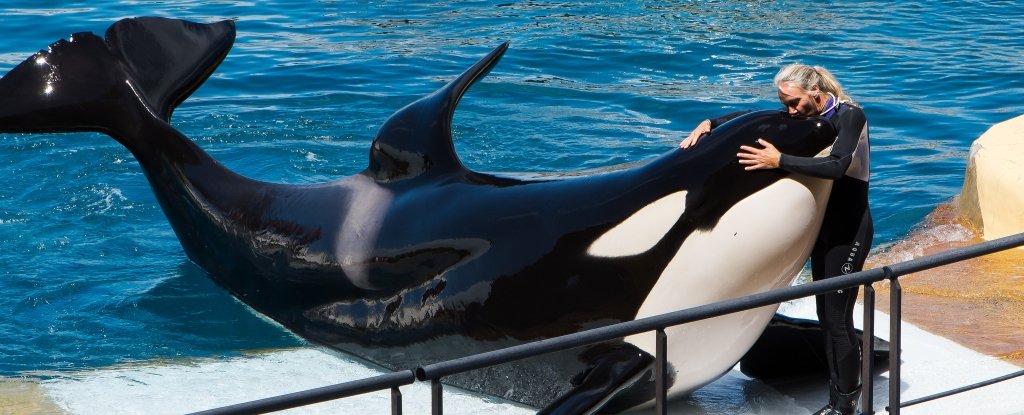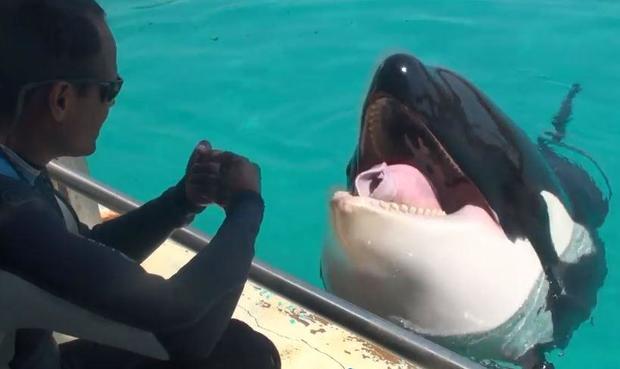Orca Wikie Vocalizing Humanspeak
"Vocal imitation is a hallmark of human spoken language, which, along with other advanced cognitive skills, has fuelled the evolution of human culture."
"We found that the subject [orca] made recognizable copies of all familiar, novel and human sounds tested and did so relatively quickly, most during the first ten trials and three in the first attempt."
Jose Abramson, Complutense University of Madrid
"Wikie made recognizable copies of the demonstrated sound judged in real time by two observers, Wikie's trainer and one experimenter, later confirmed by both after listening to the recordings."
Researchers, reporting in Proceedings of the Royal Society
 |
| One of the orcas living at Marineland (Olivier Bain/Flickr) |
Killer whales like the 14-year-old orca living at Antibes, France in Marineland, live in pods, each having its own "speech" dialect including calls unique to the pod. There are sound clicks expressed that are held to be the equivalent of humans calling one another by individual names, as they speak to one another. Killer whales have been observed being able to mimic the barks of sea lions and the whistles of sea dolphins, and beluga whales have been heard seeming to imitate humans.
Now, however, biologists in Spain have been the first through experimenting in training an orca named Wikie to repeat the words "hello" and "bye-bye" -- to count up to three, and even to speak the name of her trainer, "Amy" -- to record an orca vocalizing human sounds. While the remarkability of orcas to mimic human voice sounds and words opens up new areas of enquiry, it has not been established that the killer whale, while sounding the words out flawlessly has any idea what they mean. Although it does give pause to ponder just that when the killer whale mouths her trainer's name.
Previously the ability to mimic human speech was believed to be possible only with primates, birds, elephants and seals. Wikie has proven an exception, or perhaps only the first of many others of her species capable of being trained to emulate the human voice and "speak" recognizable words. The experience with her, on the other hand, seems to reflect that she is a quick learner. That experience may yet open up new opportunities to determine whether her skills reflect a greater potential within her species.
Her voice, recording the words, is available to listen to on a variety of online sites, and her voice truly is remarkably akin to that of a human speaking. Humans have certain vocal chords, the larynx enabling speech in the species, and these are not shared by whales who are thought to make their underwater sounds through nasal passages with the use of air bursts. Scientists believe that whales have differentiating "accents" reflecting individual "cultures" that the young of their species adopt through imitation in patterning after adults, reflective of the very method by which humans acquire speech.
In the trial just recently reported on, Wikie was trained to understand a "copy" signal. She was then introduced to eleven completely new sounds offered to her by her trainer, and invited to repeat them. The sounds included words, along with sounds such as an elephant call, a wolf howl and a creaking door. As a reward for successful compliance, Wikie was presented with a fish or an approving pat on achieving the sound, thus reinforcing the learning curve. Six judges were asked to rate their opinion on whether the resulting vocalization was well matched to the original word or sound.
 |
Wikie the killer whale mimics human words with a
trainer at the Marineland Aquarium in southern France, in an image made
from video provided by researchers from the Complutense University of
Madrid.
Jose Abramson |
"Human sounds are easily recognizable by us and if they could produce a human sound that is not in their normal repertoire, that would mean that the only way they could learn it is by listening to it and reproducing it. And that's what we did."
"Our study shows that our vocal learnings, even of sounds that are not in the killer whale repertoire, is plausible.""After one has done it, one of the next questions is, can all killer whales do it? How widespread is this ability? Maybe Wikie is special, an exception, but maybe not."
"It was not about establishing a two-way communication between killer whales and humans... I doubt it sincerely. We have no evidence that [Wikie] thinks she is greeting someone in the morning and saying 'hello.'"
"Whether they could use this vocalization, these sounds they produce, whether they could use them to interact with humans or with other killer whales is a an open question, it's a fascinating question."
Josep Call, professor in evolutionary origins of mind, University of St Andrews, study co-author
Labels: Bioscience, Killer Whales, Research

0 Comments:
Post a Comment
<< Home